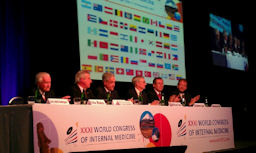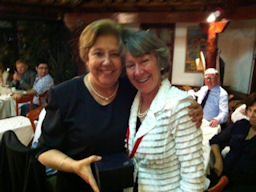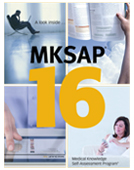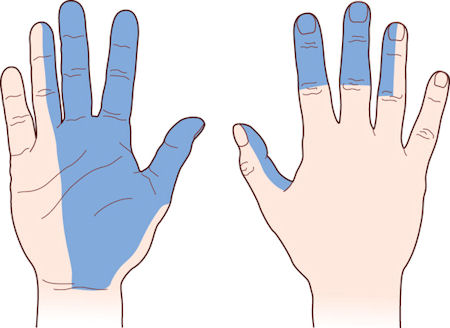- Register Now for Internal Medicine 2013
- ACP Leaders on the Road: Chile
- Update Your Knowledge with MKSAP 16 Q & A
- International Meetings Update
- Future Worldwide Internal Medicine Meetings
- ACP Welcomes New International Fellows
- Highlights from ACP Internist and ACP Hospitalist
- College Corner
- Email Page to a Colleague
Register Now for Internal Medicine 2013
Join ACP and thousands of your colleagues in San Francisco, California, and transform the way you practice medicine. Internal Medicine 2013 is the only meeting of its kind-combining clinical skills workshops with over 200 scientific sessions to update your knowledge in all facets of internal medicine and the subspecialties.
Refresh your internal medicine knowledge, sharpen your practice management skills, and network with the best and brightest physicians from around the globe. All of this plus a variety of special events including a reception for International attendees make this a meeting not to be missed.
Substantial registration discounts are available for international delegations. Groups of 10 or more are eligible for the special delegation rates. The guidelines require that one person organize the group, provide the registration forms, and submit one payment by check or credit card for the entire group. Not all participants in group delegations are required to be ACP members. Visit im2013.acponline.org/for-meeting-attendees/international-attendees/ for more information.
ACP Leaders on the Road: Chile
Virginia Hood, MD, MACP, Immediate Past President, ACP
Chile Hosts WCIM in Style
In November 2012, I was fortunate to participate in the 31st World Congress of Internal Medicine (WCIM), held in the beautiful, lively city of Santiago, Chile which was also enjoying warm spring weather and the last of the jacaranda blossoms.
Approximately 3,300 physicians, subspecialists, fellows, residents, along with some medical students, pharmacists and dieticians from over 30 countries in the Americas, Australasia, Africa and Europe attended. The speakers were experts from 23 countries, many of whom were well known worldwide. The program provided current, pertinent and when available, evidence based information which stimulated interaction and discussion in well attended sessions.
The opening session, presided over by Dr. Jose Rodriguez-Portales, FACP (a former Regent of ACP), was attended by the President of Chile. In his welcoming remarks, he challenged Congress participants by describing the pressing health care issues in Chile and the world and emphasizing the need for not only improving infrastructure but also the importance of individuals and governments working together to improve lifestyles and address the social determinants of health. The national Minister for Health, himself an internal medicine physician and nephrologist gave an informative and inspiring report about how the miners' medical issues were managed throughout the long harrowing period they were trapped underground in northern Chile.
 Opening ceremony of the World Congress of Internal Medicine
Opening ceremony of the World Congress of Internal Medicine
During the Congress, I had the opportunity to make new and renew old acquaintances with many members and leaders of internal medicine societies from all over the world as well as several ACP chapters. It was gratifying to connect with Professor In-Sung Song, Chair of the 2014 WCIM which will be held in Seoul, Korea; Professor Sudoyo, President of the Indonesian Society of Internal Medicine who will host the congress in 2016; and, to congratulate Dr. Adri Kok, the president of the Faculty of Consulting Physicans of South Africa, which was awarded the 2018 Congress.
There were a large number of visitors to the ACP booth where Wendy Rivera-Craig did an outstanding job developing and reinforcing connections. Many attendees were delighted to converse with Wendy in Spanish.

In addition to regular conference activities, visiting ACP attendees were hosted in style by Dr. Maria Pinto, FACP (pictured at right with Dr. Hood) and Dr. Jose Rodriguez-Portales, FACP (former ACP Governors and current leaders in Chilean Internal Medicine). Dr. Pinto had arranged for members of her class of ACP Governors to attend the Congress and enjoy some of the many delights of the region. I was especially fortunate to join this group for a tour and delightful luncheon at a boutique vineyard in the Casablanca Valley.
Congratulations and thanks go to the Congress leaders, Drs. Hector Ugaldi, Felix Munoz, and Guillermo Acuna for organizing an outstanding conference and for their and the Chilean people's warm and generous hospitality.
At the end of the congress I took a brief excursion 2,000 kilometers south to Patagonia where I spent a very enjoyable 5 days fulfilling my dream of trekking to the base of Torres Del Paine. In addition I was able to soak up the ambience of the majestic mountains, turquoise lakes, tumbling streams and expanses of open grasslands as well as walk through ancient forests and over glacial moraines. It was a refreshing end to a hectic 3 months of travel, meetings and presentations.
I look forward to seeing everyone in San Francisco in April for Internal Medicine 2013 and urge you to put the WCIM in 2014, 2016 and 2018 on your calendars in anticipation of truly rewarding experiences.
Update Your Knowledge with MKSAP 16 Q & A

The new Medical Knowledge Self-Assessment Program® (MKSAP® 16) provides you with the most current and critical information in the core of internal medicine and its subspecialties so you can stay aware of what you need to know as a practicing physician in internal medicine today. MKSAP 16 is published in two sections. Part A is now available and Part B will be available December 31, 2012.
For more information on MKSAP 16, or to order your copy, visit http://www.acponline.org/products_services/mksap/16/
MKSAP 16 Q & A
A 58-year-old woman is evaluated for a 7-week history of tingling pain involving the first, second, and third digits of the right hand. The pain is worse at night and radiates into the thenar eminence. The pain does not radiate into the proximal forearm. She has hypothyroidism and her only current medication is levothyroxine.
On physical examination, the patient reports pain with plantar flexion at the wrist with the elbow extended. She also reports pain with percussion over the median nerve at the level of the wrist. There is no thenar or hypothenar eminence atrophy. Strength is 5/5 with thumb opposition. A hand diagram is completed (shown) demonstrating the location of the patient's paresthesia.

In addition to avoidance of repetitive wrist motions, which of the following is the most appropriate initial treatment?
A. Local corticosteroid injection
B. Oral ibuprofen
C. Surgical intervention
D. Wrist splinting
Click here for the answer and critique.
International Meetings Update
25th Annual Meeting of the Taiwan Society of Internal Medicine
December 1-2, 2012
The 25th Annual Meeting of the Taiwan Society of Internal Medicine was held December 1-2, 2012, in Taipei, Taiwan. Approximately 1,000 physicians from around the country attended the meeting.
Phyllis A. Guze, MD, FACP, served as the ACP International Ambassador to the meeting. She was selected to speak by Pei-Ming Yang, MD, PhD, FACP, President, Taiwan Society of Internal Medicine. Dr. Guze spoke on the topic "Medicine and Engineering - a 21st Century Partnership".
Top
Future Worldwide Internal Medicine Meetings
1st Annual International Conference
Advances in Medicine & Subspecialties (AIMS 2013)
February 13 - 15, 2013
Jumeirah Etihad Towers, Abu Dhabi, UAE
AIMS 2013 is unique with many "firsts" for the region. It has been officially endorsed by the American College of Physicians, SEHA, Sheikh Khalifa Medical City (SKMC), and will have CME accreditation from Health Authority of Abu Dhabi (HAAD) as well as the Accreditation Council for Continuing Medical Education, which is the provider of CME credits in the USA.
The conference is intended for all healthcare professionals, including doctors in Internal Medicine, all of its subspecialties, General Practitioners, Family Physicians, medical residents and fellows, as well as allied health professionals. We intend to invite healthcare professionals from all of UAE and GCC countries, other Middle Eastern countries and Southeast Asia (India, Pakistan, Bangladesh).
Attendees have an excellent opportunity to get updated with a variety of topics between 9 themed sessions over a 3 day period given by prominent local and international physicians as well as enjoy the beautiful city of Abu Dhabi
A complete list of other Future Worldwide Internal Medicine Meetings is available here.
New International Fellows
ACP is pleased to announce the following newly elected International Fellows, who were recommended by the Credentials Committee and approved for election by the Board of Regents as of January 1, 2013. They are listed by current location and may have been credentialed through a different Chapter.
Bangladesh
-
Sohely Ahmed Sweety, MBBS, MD, FACP - Dhaka
Canada
-
Victor Dirnfeld, MD, FRCPC, DABIM, FACP - Richmond, BC
-
Kathryn A. Myers, MD, FACP - London, ON
Chile
-
Hernan A. R. Prat Martorell, MD, FACP - Santiago
Colombia
-
Paulo Archila, MD, FACP - Bogota
- Rafael C. Botero, MD, FACP - Bogota
- Rodolfo J. Dennis, MD, FACP - Bogota
- Gustavo A. Marquez, MD, FACP - Corozal Sucre
- Eugenio Matijasevic, MD, FACP - Bogota
- M. N. Nino de Arboleda, MD, FACP - Bogota
-
Marco Solarte, MD, FACP - Pasto Narino
Guatemala
-
Carlos Nitsch, MD, FACP - Guatemala
India
-
Sarma Vsn Rachakonda, MD, FACP - Tiruvallur
Japan
-
Haruhiko Banno, MD, FACP - Nagoya Aichi
-
Masahito Katahira, MD, FACP - Ichinomiya, Aichi
Mexico
-
Miguel A. Villarreal-Alarcon, MD, FACP - Garza Garcia, NL
New Zealand
-
Christopher A. Kenedi, MD, FACP - Auckland
Pakistan
-
Zahid Nabi, MBBS, FACP - Islamabad
Saudi Arabia
-
Ali A. Alaklabi, MBBS, FACP - Riyahd
- Basim Ahmed Almatouk, MD, FACP - Dharan
- Abdullah M. Assiri, MBBS, FACP - Riyadh
-
Emad A. Koshak, MD, FACP - Jeddah
Singapore
-
Boon Wee Teo, MBbCH, FACP - Singapore
Highlights from ACP Internist and
ACP Hospitalist
ACP Hospitalist December 2012
- Longer resuscitations associated with improved survival after cardiac arrest
Findings from a recent study may change practice.
- Start early
Sooner, stronger chest compressions would improve hospital codes.
- Hospitalizations may improve health but harm patients' sense of self
Even simple things like how patients are addressed can have a long-lasting effect.
- Septic sadness
Q&A with Dimitry Davidow, MD, MPH, about depression in spouses of sepsis survivors.
College Corner
Former ACP Japan chapter Governor receives prestigious awards
Former ACP Japan chapter Governor Kiyoshi Kurokawa, MD, MACP, who led the Fukushima Nuclear Accident Independent Investigation Commission, has been honored with two recent awards. Dr. Kurokawa was chosen for the list of 100 Top Global Thinkers by Foreign Policy and also received the 2012 Scientific Freedom and Responsibility Award from the American Association for the Advancement of Science. ACP congratulates Dr. Kurokawa on these well-deserved and prestigious awards.
MKSAP 16 Answer & Critique
Answer: D, Wrist splinting
Educational Objective: Treat carpal tunnel syndrome.
Key Point: Initial therapy for carpal tunnel syndrome is wrist splinting and avoidance of repetitive wrist motions.
This patient has carpal tunnel syndrome, and the most appropriate initial treatment, in addition to the avoidance of repetitive wrist motions, is wrist splinting. Wrist splinting appears to be most effective when done in the neutral position compared with 20 degrees of extension. In one prospective study, full-time splinting was superior to nocturnal splinting at 6 weeks in terms of nerve latencies, although there was significant cross-over of patients between groups in this study. Nocturnal splinting has the advantage of being more convenient to patients in comparison with full-time splinting.
Local corticosteroid injection has been shown to provide short-term (up to 3 months) pain relief, although the effect does not appear to be durable. Contraindications to local corticosteroid injections include thenar weakness and atrophy, profound sensory loss, and acute carpal tunnel syndrome.
Owing to possible adverse effects, drug therapy should be reserved for patients in whom wrist splinting has failed. Although NSAIDs are frequently used as first-line therapy, evidence is lacking as to their effectiveness.
Surgical intervention should be reserved for patients in whom both nonpharmacologic and pharmacologic conservative therapies have failed. Other indications include progressive sensory or motor deficits and moderate to severe findings on electrodiagnostic studies. In one randomized controlled trial of 116 patients, those with carpal tunnel syndrome who underwent surgical intervention had better outcomes (function and symptoms) than those who underwent nonsurgical management, although clinically, the benefit was modest.
Bibliography:
Jarvik JG, Comstock BA, Kliot M, et al. Surgery versus non-surgical therapy for carpal tunnel syndrome: a randomised parallel-group trial. Lancet. 2009;374(9695):1074-1081. [PMID: 19782873]

